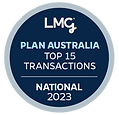
Home Loan Deposit: How Much You Need and How It Affects Your Loan
Saving a home loan deposit is one of the biggest steps in the journey to buying your first home. Your deposit size affects your borrowing power, your interest rate, and whether you’ll need to pay Lenders Mortgage Insurance (LMI). Understanding how deposits work—and why they matter—can help you plan your purchase more effectively and potentially save thousands.
Below is a clear breakdown of how deposits, LVR, and LMI work in Australia.
What Is a Home Loan Deposit?
A home loan deposit is the amount of money you contribute upfront towards purchasing a property. It is usually expressed as a percentage of the property’s purchase price. For example:
-
20% deposit on a $800,000 property = $160,000
-
10% deposit on a $800,000 property = $80,000
The larger your deposit, the lower your home loan amount—and the lower your long-term interest costs.
What Is Loan-to-Value Ratio ( LVR )?
Your Loan-to-Value Ratio (LVR) is one of the most important factors in determining your borrowing options. LVR shows how much of the property’s value you’re borrowing.
How LVR is Calculated
If you’re buying a property for $800,000 and borrowing $640,000,
your LVR is:
$640,000 ÷ $800,000 = 80% LVR
This means you've saved a 20% deposit.
Why LVR Matters
Your LVR affects:
-
Whether you need LMI (required above 80%)
-
Your interest rate
-
How many lenders will approve you
-
How much you can borrow
Borrowers with a lower LVR are considered lower risk, giving you more home loan options and potentially better rates.
What Is Lenders Mortgage Insurance (LMI)?
Lenders Mortgage Insurance (LMI) protects the lender—not the borrower—if you are unable to repay your home loan. It becomes mandatory when your LVR is above 80%, meaning you’re borrowing more than 80% of the property’s value.
When Do You Pay LMI?
You may need to pay LMI if:
-
You have less than 20% deposit
-
You are borrowing above 80% LVR
-
You need to stretch your borrowing capacity
How LMI Is Calculated
LMI premiums depend on:
-
Your LVR
-
The size of your loan
-
The lender’s risk assessment
-
Whether you’re a first home buyer or refinancer
-
Higher LVR = higher LMI premium.
How You Can Pay LMI
Borrowers can either:
-
Pay LMI upfront or
-
Capitalise it into the loan (add it to your mortgage and repay it over time)
Can You Avoid Paying LMI With Less Than 20% Deposit?
Yes — there are several ways to avoid paying LMI, even if you haven’t saved a full 20% deposit.
1. Government Home Buying Schemes
First home buyers may qualify for government-backed programs such as:
-
First Home Guarantee (FHBG)
-
Regional First Home Buyer Guarantee (RFHBG)
-
Family Home Guarantee (FHG)
These programs allow eligible buyers to purchase with as little as 5% deposit without paying LMI.
2. Using a Guarantor (Family Guarantee)
A parent or close family member can use part of their property equity as security for your loan. This reduces your LVR and can help you:
-
Avoid LMI entirely
-
Borrow up to 105% of the purchase price
-
Reduce out-of-pocket costs significantly
3. Professional Packages
Certain professional groups—such as medical professionals, accountants, lawyers, and engineers—may be eligible for LMI waivers or large discounts depending on the lender.
4. Increasing Savings or Using a Gift
Boosting your deposit through savings, bonuses, tax returns, or family gifts could help you reduce your LVR below 80%.
How Much Deposit Do You Really Need?
While the ideal deposit is 20%, many buyers purchase with:
-
5% deposit (with LMI or government schemes)
-
10% deposit (reduced LMI)
-
15% deposit (small LMI premium)
-
20% deposit (no LMI)
Your deposit size should align with your overall financial strategy—not just your savings.
Need Help Understanding What Deposit You Need?
Every borrower’s situation is unique. If you're unsure how much deposit you need or want to explore ways to avoid paying LMI, speak with our mortgage experts today. We can guide you through your borrowing options, government schemes, and strategies to enter the property market sooner.

Need More Information?
Talk to Our Home Loan
Experts Today.

We're Here To Support You Through The Entire Home Buying Journey.
Make an Enquiry
Send us an enquiry or call 1300 103 998. Our team will get back to you within 30 minutes during business hours — and our service is completely free.
Get a pre-approval
We’ll review your situation, help you understand your borrowing power, and organise your home loan pre-approval. We’ll also check your eligibility for Australian Government first home buyer grants to help you get into the property market sooner.
House Hunt
Once you're pre-approved, you can confidently start house hunting. We can also introduce you to trusted conveyancers and buyers agents to help guide you through every stage of your home-buying journey.
Settlement
Once you sign the contract, our team will manage the loan settlement with the bank, ensuring a smooth transition to becoming a homeowner. Our service doesn’t stop here — we’ll check in with you every six months to make sure everything is going smoothly.
.png)







.png)
